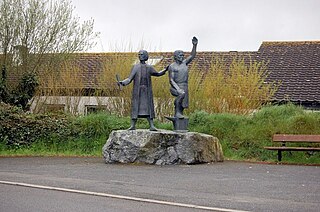Duke of Cornwall is a title in the Peerage of England, traditionally held by the eldest son of the reigning British monarch, previously the English monarch. The Duchy of Cornwall was the first duchy created in England and was established in a royal charter in 1337 by King Edward III. Prince William became Duke of Cornwall following the accession of his father, King Charles III, to the throne in 2022, and his wife, Catherine, became Duchess of Cornwall.

The Duchy of Cornwall is one of two royal duchies in England, the other being the Duchy of Lancaster. The eldest son of the reigning British monarch obtains possession of the duchy and the title of Duke of Cornwall at birth or when his parent succeeds to the throne, but may not sell assets for personal benefit and has limited rights and income while a minor.

Stannary law is the body of English law that governs tin mining in Cornwall and Devon; although no longer of much practical relevance, the stannary law remains part of the law of the United Kingdom and is arguably the oldest law incorporated into the English legal system.

The Cornish rebellion of 1497, also known as the First Cornish rebellion, was a popular uprising in the Kingdom of England, which began in Cornwall and culminated with the Battle of Deptford Bridge near London on 17 June 1497.

The history of Cornwall goes back to the Paleolithic, but in this period Cornwall only had sporadic visits by groups of humans. Continuous occupation started around 10,000 years ago after the end of the last ice age. When recorded history started in the first century BCE, the spoken language was Common Brittonic, and that would develop into Southwestern Brittonic and then the Cornish language. Cornwall was part of the territory of the tribe of the Dumnonii that included modern-day Devon and parts of Somerset. After a period of Roman rule, Cornwall reverted to rule by independent Romano-British leaders and continued to have a close relationship with Brittany and Wales as well as southern Ireland, which neighboured across the Celtic Sea. After the collapse of Dumnonia, the remaining territory of Cornwall came into conflict with neighbouring Wessex.

William Jory Henwood FRS, was a Cornish mining geologist. He was a prolific writer on geological topics, for which he was awarded the Murchison Medal of the Geological Society of London.

The constitutional status of Cornwall has been a matter of debate and dispute. Cornwall is an administrative county of England.
A stannary was an administrative division established under stannary law in the English counties of Cornwall and Devon to manage the collection of tin coinage, which was the duty payable on the metal tin smelted from the ore cassiterite mined in the region. In Cornwall, the duty was passed to the Duchy of Cornwall; in Devon to the Crown.
The Cornish Stannary Parliament was the representative body of the Cornish stannaries, which were chartered in 1201 by King John. In spite of the name, the Parliament was not a Cornish national assembly, instead representing the interests of the tin industry; however, due to the significant proportion of Cornwall's population involved in the tin trade, it wielded considerable power.

The Lord Warden of the Stannaries used to exercise judicial and military functions in Cornwall, England, UK, and is still the official who, upon the commission of the monarch or Duke of Cornwall for the time being, has the function of calling a stannary parliament of tinners. The last such parliament sat in 1753.

In Devon and Cornwall, tin coinage was a tax on refined tin, payable to the Duchy of Cornwall and administered in the Stannary Towns. The oldest surviving records of coinage show that it was collected in 1156. It was abolished by the Tin Duties Act 1838.

Mining in Cornwall and Devon, in the southwest of Britain, is thought to have begun in the early-middle Bronze Age with the exploitation of cassiterite. Tin, and later copper, were the most commonly extracted metals. Some tin mining continued long after the mining of other metals had become unprofitable, but ended in the late 20th century. In 2021, it was announced that a new mine was extracting battery-grade lithium carbonate, more than 20 years after the closure of the last South Crofty tin mine in Cornwall in 1998.
The Revived Cornish Stannary Parliament, was a pressure group which claimed to be a revival of the historic Cornish Stannary Parliament last held in 1753. It was established in 1974 and campaigned, up until 2008, against the government of the United Kingdom's position on the constitutional status of Cornwall.

The Stannary Palace, also known as the Duchy Palace, was a complex of buildings operated by the Dukes of Cornwall as the centre of their administration. The surviving exchequer hall is a Grade I listed building.

Cornish nationalism is a cultural, political and social movement that seeks the recognition of Cornwall – the south-westernmost part of the island of Great Britain – as a nation distinct from England. It is usually based on three general arguments:
Currently, there are two duchies in England; the royal Duchy of Lancaster and the royal Duchy of Cornwall. Unlike historic duchies in England, these are no longer coextensive with a distinct geographic area, although they originated in the counties palatine of Lancaster and Cornwall. Rather, they are "Crown bodies", regulated by Acts of Parliament, that have some of the powers of a corporation or trust. The administration of the duchies is regulated by the Duchies of Lancaster and Cornwall (Accounts) Act 1838. The duchies invest primarily in land, and their income is payable either to the monarch or the monarch's eldest heir.

The Duchies of Lancaster and Cornwall (Accounts) Act 1838 is an Act of the Parliament of the United Kingdom.

The Duchy of Cornwall Management Act 1868 is an act of the Parliament of the United Kingdom.
Presented below is an alphabetical index of articles related to Cornwall:
The Stannary Convocation of Devon, also known as the Great Parliament of the Tinners or as the Devon Stannary Parliament, was an assembly in the English county of Devon, with the power to amend and expand the stannary law in the county. Initially assembled in the Middle Ages by the Lord Warden of the Stannaries, the Stannary Convocation developed out of the predecessor to the judicial Courts of the Vice-Warden of the Stannaries but was established as an institution in its own right by the sixteenth century, with the power to both proclaim the existing customs as English law and to legislate regarding the laws by which tinners, who were exempt from the jurisdiction of the ordinary English courts until 1896, conducted their business.









